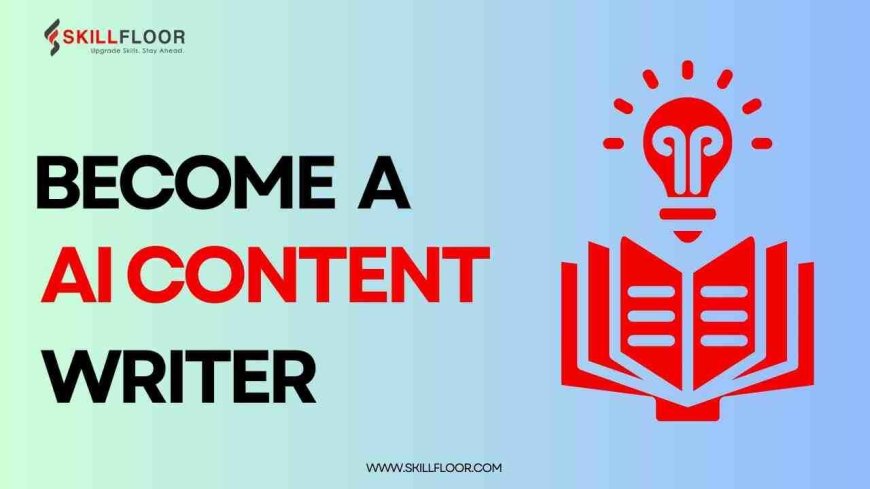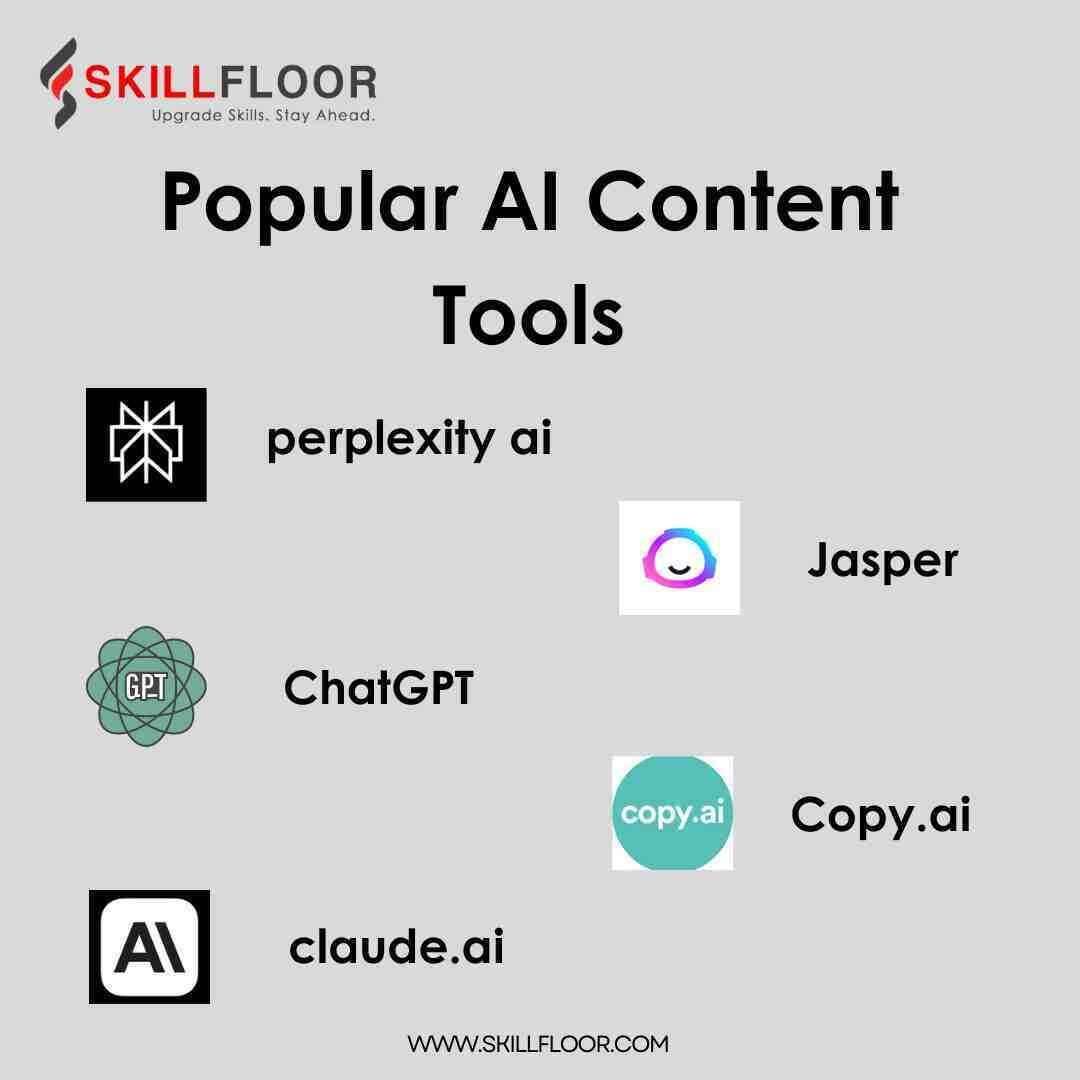How to Become a Content Writer with AI
Discover practical tips on how to become a content writer using AI tools. Learn to leverage technology for creating engaging and effective content.

AI is significantly transforming content creation by automating and optimizing various aspects of the process. Advanced AI tools can generate written content, such as articles and reports, with minimal human input, enabling the rapid production of large volumes of material. Additionally, AI enhances personalization by analyzing user data to tailor content to specific audience preferences, improving engagement and effectiveness.
AI also aids in the creative process, offering new ideas and generating multimedia content like images and music. Furthermore, AI-powered editing tools help refine content for better quality and readability. Despite these advancements, challenges such as ethical concerns, potential job displacement, and issues related to authenticity and misinformation persist. Overall, AI is making content creation more efficient and personalized, though it requires careful management to address its associated challenges.
AI's influence in content creation is growing significantly, transforming how content is produced, personalized, and consumed. AI tools can now generate content with minimal human intervention, enabling platforms like OpenAI's GPT-4 to produce articles, reports, and creative pieces quickly and cost-effectively. By analyzing user data, AI can create personalized content tailored to individual preferences, improving engagement and conversion rates. Additionally, AI aids in the creative process by generating ideas and even composing music or art, with tools like DALL-E pushing creative boundaries. AI also optimizes content for search engines and social media, enhancing visibility and effectiveness through trend analysis and keyword optimization. Moreover, AI-powered tools like Grammarly and Hemingway refine content by checking grammar, style, and readability, ensuring a professional and error-free final product. Additionally, tools like SuperHumanizer help you make AI text sound human and protect the text from being flagged as machine-generated, which is actually a crucial thing for today's content writers.
challenges in Becoming an AI content writer
Quality and Originality: Maintaining high standards and originality in AI-generated content is challenging.
Ethical Concerns: Issues such as plagiarism, copyright infringement, and misinformation are significant ethical challenges.
Human Oversight and Control: Balancing automation with human judgment is crucial for ensuring content aligns with brand voice and legal standards.
Bias and Fairness: AI algorithms can perpetuate biases from training data, requiring careful monitoring to ensure fairness.
Technical Limitations: Challenges include handling linguistic nuances, cultural references, and domain-specific knowledge.
User Acceptance and Trust: Building trust in AI-generated content remains a hurdle due to perceived authenticity and reliability concerns.
What specific tools and strategies should new writers use?
New writers can leverage a range of tools and strategies to enhance their content creation process. Here are some specific recommendations:
Tools
-
Grammarly: For grammar checking, style suggestions, and readability improvements.
-
Hemingway Editor: To simplify and clarify writing, ensuring concise and readable content.
-
Scrivener: A powerful writing software for organizing long projects, such as books and research papers.
-
Evernote: For note-taking and organizing ideas, accessible across multiple devices.
-
Google Docs: For collaborative writing and cloud-based document management.
-
Trello: For project management and organizing writing tasks.
-
SuperHumanizer: Helps make AI-generated text sound human and keeps it from being flagged as machine-written.
-
ProWritingAid: An all-in-one tool for grammar, style, and readability checking.
-
Ulysses: A writing app designed for distraction-free writing and seamless organization.
-
Medium: A platform to publish and share your writing with a wide audience.
Strategies
-
Regular Writing Practice: Establish a daily writing routine to build consistency and improve skills.
-
Reading Widely: Read various genres and styles to gain inspiration and understand different writing techniques.
-
Setting Goals: Define clear writing goals and deadlines to stay motivated and productive.
-
Seeking Feedback: Join writing groups or workshops to receive constructive feedback and improve.
-
Editing and Revising: Dedicate time to thoroughly edit and revise your work to enhance its quality.
-
Studying Writing Craft: Read books and articles on writing craft to understand storytelling techniques and improve structure.
-
Building a Portfolio: Create a portfolio of your work to showcase your writing skills to potential clients or publishers.
-
Networking with Writers: Connect with other writers for support, collaboration, and opportunities.
-
Exploring Different Genres: Experiment with various genres to find your niche and expand your skill set.
-
Using Writing Prompts: Utilize prompts to spark creativity and overcome writer's block.
By integrating these tools and strategies, new writers can streamline their writing process, improve their skills, and produce high-quality content.
STEPS: Getting Started with AI in Content Writing
Step 1: Choosing the Right AI Tools
Overview of Popular AI Content Tools

-
ChatGPT (OpenAI)
Key Features: Generates human-like text, answers questions, and provides conversational responses.
Benefits: Versatile for various content types, easy to use, and continuously improving with updates.
-
Jasper (formerly Jarvis)
Key Features: Tailored for marketing copy, blog posts, and social media content.
Benefits: Templates for different content needs, high-quality output, and integration with SEO tools.
-
Copy.ai
Key Features: Creates marketing copy, product descriptions, and social media posts.
Benefits: User-friendly interface, quick content generation, and creative idea suggestions.
Step 2:Integrating AI into Your Writing Process
Using AI for Research and Idea Generation
-
Research: Utilize AI to gather information and data on various topics, making the research phase quicker and more efficient.
-
Idea Generation: Use AI to brainstorm and generate unique ideas for your content, helping you overcome writer's block.
Drafting and Editing with AI Assistance
-
Drafting: Leverage AI to produce initial drafts, providing a solid foundation to build upon.
-
Editing: Use AI tools to refine and polish your drafts, ensuring grammar accuracy, coherence, and readability.
Ensuring Originality and Avoiding Plagiarism
-
Originality: Employ AI tools like a plagiarism checker to ensure your content is unique and original.
-
Verification: Cross-check AI-generated content with plagiarism detection software to maintain integrity.
Step 3: Enhancing Your Skills with AI
Learning from AI-Generated Content to Improve Writing Style
-
Analysis: Study AI-generated content to understand different writing styles and techniques.
-
Application: Apply these insights to your writing, enhancing your versatility and adaptability.
Using AI Feedback for Editing and Refining Your Work
-
Feedback: Utilize AI tools that provide constructive feedback on grammar, style, and structure.
-
Improvement: Incorporate this feedback to refine your work, making it more polished and professional.
Balancing Creativity and AI Efficiency
-
Creativity: While AI offers efficiency, maintain your creative input to produce authentic and engaging content.
-
Efficiency: Use AI to streamline repetitive tasks, freeing up time for creative thinking and innovation.
Step 4 Building a Career as an AI-Enhanced Content Writer
Marketing Yourself in the AI Era
-
Portfolio: Showcase your ability to use AI tools effectively in your writing portfolio.
-
Skills: Highlight your proficiency with AI tools in your resume and online profiles.
Networking with Other AI-Savvy Writers and Professionals
-
Community: Join online forums, writing groups, and professional networks focused on AI in content writing.
-
Collaboration: Collaborate with other AI-savvy writers to share knowledge and opportunities.
AI in content writing offers transformative opportunities to enhance efficiency, creativity, and effectiveness. AI-powered tools can streamline the research, drafting, and editing processes, enabling writers to produce high-quality content at scale. By leveraging AI for idea generation, personalized content creation, and real-time feedback, writers can elevate their skills and deliver more engaging material tailored to audience preferences. However, it's crucial to navigate challenges such as maintaining originality, addressing ethical concerns, and ensuring content aligns with brand voice and audience expectations. As AI continues to evolve, aspiring content writers can capitalize on these advancements to build successful careers.






























































